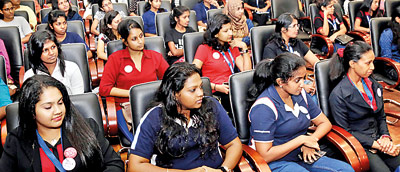Arts
IT’s for women too
Gender equality and information technology are widely discussed topics of this generation.

From left to right - Ho Se Mun, Executive Director of Singapore infocomm Technology Federation; Vidumini Ranasinghe, Project Director, MillenniumIT; Shamini Wickremasekera, Chief Risk Officer at LOLC; Vishaka Nanayakkara, Senior Lecturer, Department of Computer Science and Engineering, University of Moratuwa; Yashinka Jayasinghe Alles, Education Programmes Manager, Microsoft; Chadika Yahampath, Manager Administration and Operations, FITIS; Rosy Senanayake, Deputy Head and spokesperson for the Prime Minister’s Office of Sri Lanka; Chitranganee Mubarak, Chairperson of ICTA; Mihiri Wikramanayake, Editor, TechAdvisor.lk and Chinthaka Wijewickrama, Chairperson of FITIS
Fifteen years into the 21st century, many would like to believe gender equality has progressed as much as IT, but when tech giant Google, followed by several other companies, released its diversity record last year, it sparked global concern on the under-representation of women in the industry.
Women accounted for just 17 percent of Google’s international technicalworkforce. While the CEOs of IBM, HP and YouTube are notably all women, the figures for women in leadership within the industry were at 21 percent for Google, 23 percent for Microsoft and 21 percent for Twitter.
A recent forum on women and IT in Sri Lanka titled ‘We can do IT’, hosted by the Federation of Information Technology Sri Lanka (FITIS), Millennium IT and TechAdvisor at Infotel 2015, brought together successful women in the Sri Lankan industry to explore opportunities and popular misconceptions about IT for the benefit of young women hoping to enter the industry.
“IT is the fourth largest contributor to Sri Lanka’s GDP,” said FITIS Chairman Chinthaka Wijewickrama. “We as an industry want more females to come into this.”
“We start with a disadvantage. Girls are given dolls to play with while boys are given techie stuff like trains and cars,” said Chairwoman of Information and Communication Technology Agency (ICTA), Chitranganie Mubarak.
Mrs. Mubarak stressed the importance of encouraging girls to think logically and sequentially at a young age and fostering STEM subjects– science, technology, engineering and mathematics – in which research shows women are largely underrepresented.
“Is this due to lack of opportunity or interest?” asked Executive Director of Singapore infocomm Technology Federation, Ms. Ho Se Mun.
“We need to build the image and awareness of the industry to go beyond programmers,” said Ms. Ho Se Mun. “Getting men to mentor and support women is also important to have them open to equal opportunities for women.”
“The whole world has evolved into a knowledge economy, but Sri Lanka is still a commodity exporter,” said former MP, Prime Minister’s Spokesperson and Deputy Head of the Prime Minister’s Office, Rosy Senanayake.
“We like to brag about our high literacy rate, but when we talk about women in employment the numbers are skewed towards lower wage and labour-oriented jobs. I am saddened that women in leadership don’t go beyond 10 percent in every sector.
This nation has not yet realised the capacity of a woman. We ourselves as women have not realised it.”

Participants at ‘We can do IT’
The panel of speakers also included– Vidumini Ranasinghe (Project Director, Millennium IT), Vishaka Nanayakkara (Senior Lecturer, Department of Computer Science and Engineering, University of Moratuwa), Yashinka Jayasinghe Alles (Education Programmes Manager, Microsoft) and Shamini Wickremasekera (Chief Risk Officer, LOLC Group).
They shared insights into the current local industry, which while male dominated is not necessarily unaccommodating of women, they said.
“What drove me to IT was that I knew that IT could change the world,” said Yashinka. “We need to sit at the table, even if it is male dominated, take a seat.”
Having to balance work with her responsibilities as a mother she said, “I’m hardly at office, per se. My office is actually on my phone or PC.
One of my main points for staying at Microsoft is because it enables you to work from anywhere.”
“There is infrastructure and support that companies provide for employees,” said Vidumini. Millennium IT, for example provides daycare for parents with young children.
Vishaka, who has disregarded stereotypes ever since she decided to study Computer Science and Engineering at university, highlighted women’s role in shaping perceptions of employers.
“Understand the responsibility and show your employer that you’re ready to take the challenge. Don’t expect to be treated differently, or let them treat you like a second class citizen,” she said.
Students in the audience also identified a lack of awareness about careers in IT and lack of parental support for IT as problematic. “We only focus on studies and grades.
“Even though I had this passion for IT, I was hesitant to choose it at firstbecause I didn’t know the different career options,” said IT student, Oshani Singapuliarachchi. Vishaka agreed that IT is undervalued as a subject – “You cannot get into engineering at a state university with IT.
I keep asking my faculty why we need chemistry but not IT,” she said.
Multitasking and empathetic qualities were also discussed as advantageous for women in roles of leadership and management.
In fact, more women in IT could help balance the scales in other industries as IT permeates practically every sector of today’s economy.

